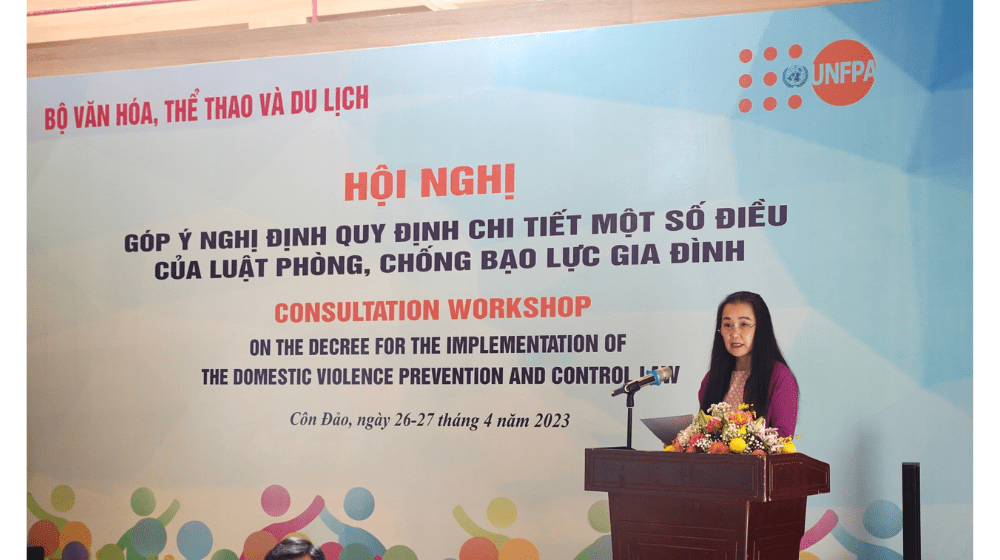- Mr. Khuat Văn Quy, Deputy Director of the Family Department, Ministry of Culture, Sports an Tourism;
- Representatives from the Government’s ministries and agencies and from the Ba Ria – Vung Tau local authorities;
- Representatives from international organisations, civil social organisations and local media;
I’m honoured to co-chair another important consultation workshop to discuss the draft Decree, stipulating a number of articles on the 2022 Law on Domestic Violence Prevention and Control. The Ministry of Culture, Sports and Tourism will submit the draft Decree to the Prime Minister for approval in May 2023.
UNFPA would like to take this opportunity to once again congratulate the Ministry of Culture, Sports and Tourism for its tireless efforts in reviewing and amending the previous Law on Domestic Violence, while having consistently applied the human-rights and gender-based approaches, taking gender-based violence survivors as the centre. The approval of the 2022 Law on Domestic Violence Prevention and Control by the National Assembly in November 2022 reflects the Government’s strong commitment to addressing domestic violence in Viet Nam.
The 2022 Law would not have been finalised and approved without positive comments and recommendations raised by senior officials from the Government’s ministries and agencies, from provincial and municipal authorities and other stakeholders at a series of consultation workshops which were held by the MOCST with technical support from UNFPA during the amendment process.
Today, UNFPA is very happy to continue to provide technical and financial support to the Ministry of Culture, Sports and Tourism in the drafting process of this Decree.
We believe that your participation at this consultative workshop plays a significant role in supporting the Ministry to finalise the draft Decree, an important legal framework to ensure the effective implementation of the 2022 Law.
Dear participants,
The 2022 DVPC Law consists of 6 chapters and 56 articles with many new provisions which need to be specified in the Decree. They include articles with a definition of many additional acts of domestic violence, different measures to prevent domestic violence and to protect and support survivors of violence. The 2022 Law also enhances the State's obligations to annually allocate a budget to effectively prevent and control domestic violence, including the development of facilities to support survivors of domestic violence.
It is also essential that during the drafting of the Decree, the rights-based and gender-sensitive approaches will be consistently considered to protect the rights of survivors and ensure the responsibilities and obligations of the perpetrators. We think it necessary that your comments and recommendations take such approaches into full consideration.
Dear participants,
UNFPA would like to take this opportunity to recall the models which have been introduced in Vietnam in the past couple of years by UNFPA, with financial support from the Governments of Korea, Japan and Australia to protect and support survivors of violence. They include the 24/7 toll-free hotline run by the Vietnam Farmers’ Union and four One Stop Service Centres, also known as Anh Duong House run by the Ministry of Labour, Invalid and Social Affairs and the social organisation. The Anh Duong House provides essential comprehensive and integrated services to women and girls who are experiencing and/or at risk of violence.
As of today, the hotline received and reached out to more than 11,300 calls to provide consultation and support to nearly 1,400 women and girls suffering from domestic violence. Meanwhile, the four Anh Duong Houses have directly supported 43 survivors of violence at the House as well as 133 survivors in communities. However, there are still higher demands across Vietnam.
As you all know, the 2019 National Study on Violence against Women in Vietnam revealed that nearly 2 in 3 women (62.9%) experienced at least one form of physical, sexual, psychological, and economic violence and controlling behaviours by their husband in their lifetime. And half of the women who experienced physical and or/sexual violence by a husband/partner has told no one about it, and 90.4 percent of them did not seek any help from authority. As such, the development and replication of the Anh Duong House models are needed to be able to reach out as many women and girls as possible. The draft Decree should stipulate regulations to facilitate the development of similar national hotlines and facilities for domestic violence prevention and control.
UNFPA commits to accompanying the Government of Viet Nam in the path to ending violence against women and girls. We want to ensure that all women and girls in Viet Nam, including those most vulnerable, have the right to live a life free of violence and with dignity. No one should be left behind in the country’s sustainable development process.
With this, I wish you every success for the consultation workshop today.
Thank you for your attention.


